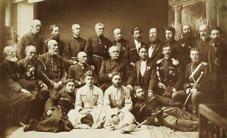
Ivane Bagration-Mukhraneli - Country of Liquid Sun
Monday, March 30
1889 – Paris: Royal Hall hosted the International Wine Exhibition. The orchestra played and the mood was festive. Aristocrats form various countries, dress in expensive frock coats, were inviting the guests and famous sommeliers to taste their wines.
Several tens of bottles, with still unknown labels, modestly placed in one quiet corner, were waiting, seemingly in vain, for the assessment of public. The uncertainty of the visitors was boosted by the inscription “Prince Ivane Mukhranbatoni’s Wines. Russia”. One of the invited guests knew that these wines were made not of grapes harvested in Russia bt from vineyards from a small and unknown country located on the slopes of the South Caucasus Mountains.
The Grand Prix of the International Exhibition in the form of a gold medal was earned by this modest wine, Mukhraneli - with its maker and the owner of the vineyard, Ivane Mukhranbatoni, awarded a very rare prize – the Officer de Merite Agricola, by the French government of that time. Ivane Mukhranbatoni, who was 78 years old at that time, had harvested the fruits of his 15 years of diligent wine making work which brought him a deserved success and recognition.
Mukhrani and its environs have always been considered as an outstanding place from strategic as well as economic points of view in that it was where all important trading and transport routes crossed each other and which made the region prosperous from the earliest times.
Archeological excavations provide traces of ancient life and civilization in the area. In the Middle Ages, Mukhrani also played a very important role in the formation of the first Kartli (Iberia) Kingdom in the beginning of our era and then again in the national unification of Georgia by the 10th century. In the second to fourth centuries AD., Dzalisi was the centre of the region which was outstanding for its uniqueness and development of wine making.
At the beginning of the 19th century, serving in the Russian Army and having a military career was considered prestigious for the Georgian aristocracy. They studied military art in Russia and then served in the Russian forces but were always aware that sooner or later they would use their acquired knowledge and military skills to protect their homeland.
In Addition to his brilliant military talent and extraordinary bravery, Mukhranbatoni was always distinguished by his skill of relations with people. In 1875 in Livadia, delivering speech upon the twenty-fifth anniversary of the inauguration of Alexander II, he fascinated even the Emperor and his wife. His welcome speech for the Emperor, delivered in the palace of the ruler on 28 September 1888, also had a great resonance in the press and public.
It is an unfortunate reality but this young man Bagrationi, who had a great deal of merits, was not lucky in love. As with other representatives of the higher aristocracy of that time, such as Nikoloz Baratashvili, Grigol Orbeliani and Giorgi Eristavi, amongst others, Ivane was an admirer of Ekaterine Chavchavadze, the most desired woman of the time and daughter of Aleksandre Chavchavadze who, as Is known, preferred the Ruler of Samegrelo, David Dadiani, to all her “admirers wounded in the heart”, whose marriage to him brought her the title of Queen.
From the very beginning, Mukhranbatoni’s goal was the development of viticulture and wine making. His dream was to plant vineyards on his ancestors’ estates and establish a strong wine making center. He made a great deal of efforts and did his best to turn his dream into reality. The well-educated and talented landlord was well aware that for Russians who were more accustomed to European tastes, the wines made according to the traditional Georgian method would be sour and coarse. For this reason, he tried to introduce the European practice of making and aging wine although it took a great deal of time to obtain a product analogous to the European one. The impression he received in France made a great impact upon him who travelled to France in 1875 to become acquainted with European achievements in wine making.
Upon his return from France, he finally decided to set up his estate, For this purpose, he engaged the French agronomist, Oden, who was assigned to Georgia to supervise the Kutaisi School of Economics. Mukhranbatoni secured his interested by offering him the best land areas, giving him temporary ownership of 400 dessiatinas of land.
Moreover, Mukhranbatoni in partnership with Zakaria Jorjadze, a famous wine maker, and other specialists undertook the almost impossible mission with immense efforts, asporation and diligence and eventually succeeded to build a 1.2 million liter-capacity winery in the village of Mukhrani where Georgian wines would be made by the European method. Based upon the experience he obtained in France and from Oden, he introduced the use of prining scissors, planting of vineyards with iron tips, sorting of grapes and aging of wine, amongst other issues.
By the end of the 19th century, the highest quality of his wines were finally recognized in the Russian Empire. The success of his wines was demonstrated at the Emperor’s gardening and wine making laboratory in 1895.
Together with the wine making, the Mukhrani palace and its cellars would be regarded as Mukhranbatoni’s real professional image and business card. The construction of the palace, within certain phases took 12 years.




